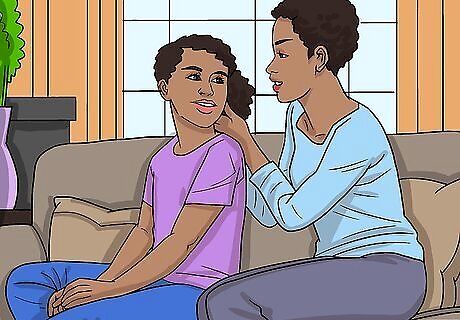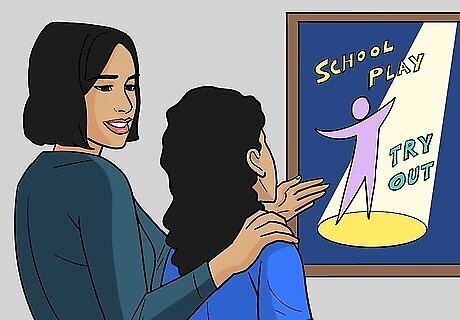
views
You may be busy as well, with work, family, money, and so much more. Do either of these situations sound like you? If so, you need to improve your mother-daughter relationship and overall bond.
It might sound hard, but after a while, you'll realize that it isn't as hard as you thought. After all, she is your daughter. If, though, you still don't know how to have fun with her and find a common bond, don't worry. Just read this article for all the help you'll need.
Set aside time to spend with her.

Try to find time in your schedule to do things with your daughter. Pick a certain day of the week or time of the day when both you and she are free, like Sundays or Thursday nights. It's good to do it the same day and time so you and she can remember when your special time together is, and you will be more likely to be free. Summer is a great time to do things together because your daughter will likely be out of school. If you are still working in summer, try to find time on the weekends to spend with your daughter. Ask for fewer hours at work, if you have to. Aim for at least an hour or two a day to spend with your daughter. Pick a time when your daughter is free, as well as you. Ask her, "Do you want to do something on ________ night?" Or, ask her when she is free, you'll be sure to find sometime. However, on weeknights, your child will probably be quite busy with her schoolwork. Respect that, and find a different time to spend together.
Know what your daughter likes.

Knowing what kinds of activities your daughter enjoys will help greatly when you spend time together because you'll know what to do and where to go. Observe your child sometimes, but not too often, to see what they are doing. They might be on the computer, TV, drawing, reading, or playing outside. Look more into what she is doing, though, to get more clues into what she likes. If she is reading, ask her what she is reading. If she is watching TV, ask her what she is watching, and if she is on the computer or outside, ask her what she is playing. You'll get a better feel for what she likes, and when you ask, she'll feel glad that you are interested in what she is doing. Her interests may be very different from yours, but don't try to change what she likes and dislikes. Try to learn more about your daughter's interests yourself, and do things relating to those activities. If she likes reading, for example, read together at home or spend an afternoon at the library. If she likes soccer, play a game or two in your backyard or the park. If your daughter likes painting or drawing, take her to an art museum.
Go shopping together.

If there's one thing that will build girls' relationships, it's shopping. You'll have a chance to talk and find more about your daughter's interests while getting new things. Take her with you to the grocery store to help you pick out dinner or delicious snacks. Have her put some items in the cart that she likes, and help decide what drinks to buy. If your daughter loves to read, go to a local bookstore and look for some books together. Or, go to a shopping mall. Look for clothes and shoes. You could also have her help you pick out clothes for yourself. She'll love to be your "fashion consultant", especially if she's into fashion. You can also go to a toy store if your daughter is younger. Let her go by her style. When shopping for clothes, shoes, books, or anything, especially with teens, let your daughter pick what she likes. She's just expressing herself and being herself, she is her own person. You could always ask, "Do you like this?", but don't force her to buy and wear something she doesn't really like. Shop at a store your daughter really enjoys so she'll be more likely to find something she likes.
Go out.

If you don't want to shop, there are still plenty of options. Some are the pool, park, beach, restaurant, museum, or amusement park. Now that you know your daughter's interests, you can start to know where she might want to go. Like stated before, pick somewhere that she would like. Take your baseball lover to her favorite team's game, or an artist to the arts and crafts store. Another important factor is the weather. Check online, on TV, or in the newspaper for details on the weather. Save outdoor activities like theme parks and the pool for sunny days. If it's winter, go to a cafe for some hot chocolate or make a snowman. You can always go in your backyard and play with your daughter, no matter the weather. Make a snow fort, have a snowball fight, make snow angels, or make a snowman. If your daughter likes sports, go skiing, sledding, or snowboarding. And don't fret if it's raining. Go to a movie theater, a restaurant, an indoor pool, the library, museum, really anywhere indoors.
Watch a good old movie at home.

This is a great activity if it's raining out. Watching movies can also really bring you closer. Look through your movies together and find one that you and your daughter want to watch. Make sure it is appropriate for her age! Funny family movies are good for all ages and will always make you and her smile. There are still other choices, though. Some movies you and your daughter might like are Pretty in Pink, Drop Dead Fred, and My Girl. If you don't have good movies at home, go to a theater and see one. Another good choice is to watch TV. You can find a TV show that the both of you would like, and make sure you have time to watch it. It will most likely come on at the same time every day, which will be good for your schedule. If neither of you are home at the time, record the TV show.
Help her with her schoolwork.

As a mom, it's important that you should support your daughter in her education. Always try to help her with homework if she asks for it. Don't give her the answer, help her. For example, if she is struggling on a math problem, don't just say "32". Say, "You have to ________" while still having her interact. Go through the steps with her, for example, "Then you multiply. What is 9 times 13?" so she'll know what to do next time. Also try to help her if she doesn't ask for it, but you get a hint that she needs help. If she's been doing homework for a long time, ask her if she needs any help she can always come to you. Same with if your daughter got a poor grade on a test. Make learning fun. Turn studying for a spelling or vocab test into a game of Jeopardy. Or, have your daughter be the teacher, teaching you about it. Study with her. There might be an important test coming up, so it's your job to help her study. She'll probably tell you what to do e.g. Give me the word and I'll say the definition.
Play a game.

Another way to interact with your daughter is through playing a great game. Have a game night with the two of you on a certain day, or just ask her if she'd like to play a game. Some good family games you might want to play are Sorry, Monopoly, Life, Scrabble, Taboo, and Snakes and Ladders, but you could really play any game. Card games are also fun. Play Bluff, War, Go Fish, or UNO if you have a spare deck.
Cook something together.

Another fun way for the two of you to bond is through cooking or baking. It's also a good way to start teaching them how to cook if they are older. Bring out some cookbooks and look through them with your daughter to see what to make. You can make cookies, a cake, cupcakes, cookies, brownies, or any dessert. You could also make your own bread or bagels, make a tart, crisp, smoothies, soup, stew, or even your own ice cream! Remember that you are cooking together. Let your daughter do some things, like cracking eggs, helping whisk the batter, pouring liquids, and decorating. Expect things to not be done perfectly – this is how children and teens learn. However, do not let her use the oven until you believe she is mature and responsible enough to deal with working around heat on her own (by the same token, don't mollycoddle her forever – children should be able to deal with cooking with heat around the age of 11 or 12).
Show her you love her.

Of course, your daughter already knows that you love her, but do you really show it? Although playing a game or watching TV is spending time together, is it really quality special time? You may not know how to do this, but it's the little things that count. Go for a nice walk together, talk, and enjoy the nature. Cheer her up on a bad day with a hug or a small gift, like a book or a stuffed animal. Give encouraging messages often, like "You can do it", "I believe in you", or "You are a very talented artist/swimmer/soccer player!". Be sure to praise her efforts above all, as it is important to let her know that it is in the trying and the doing, including learning to deal with failure, that she is going to succeed in life. With support from you, she'll be left with a positive attitude. Laugh and smile with her.
Talk.

It's important for your daughter to know that she can always come and talk to you if she needs anything. When you talk to your daughter, make sure that you look at her, and she does the same. Tell her, "I need you to listen" but in a calm, friendly way. Try to stay short and sweet, or your daughter will get bored, not focus, and think that they are in trouble or being lectured. Leave the key point for the first sentence, and keep it simple, using non-confusing and/or shorter words. You should also occasionally talk casually. When the two of you talk, it shouldn't all be serious. Talk about school e.g. What's going on in school? How was school today? But, you should also go deeper than that. Ask her about her future, sports, or hobbies.
Listen.

Not only should your daughter listen to you, but you must listen as well. If you don't, she'll think it's okay to not pay attention– also be aware that children know when their parent isn't truly listening and it isn't a pleasant feeling because it is dis-empowering. To listen, stop what you are doing to look at her. Have good eye contact with each other so you can listen. To show that you are listening, ask her questions that you have. Also, paraphrase. Paraphrasing is putting something in your own words. Say, for example, "So you're saying _______" or "You mean that ________?" so you can clarify what your daughter just said to you. Listen to what she wants to do. For example, if your daughter wants to go to a movie, don't just say "No" right away. See what you can do; look at what movies are playing, or ask her what movie she wants to see. You might not want to do it, but once in a while you should let your daughter get her way.
Be there for your daughter.

You need to always be there, whether it's through presence at an important event, advice, or by words of encouragement. If there is a sports, musical, school, or any important event that your daughter wants you to attend, really try to see if you can go. If not, see why. Try to cancel whatever it is that's on the same day, but some things you absolutely cannot miss, so be sure to tell your daughter. But it's okay if you can't actually be present at an event. There are lots of more ways to be there for your daughter. Offer help. If you see your daughter struggling in anything, like school, sports, or an instrument, help her. Listen to her play her flute, contact the teacher or help with her schoolwork, or play basketball with her. Be encouraging. It may be hard for her to do something, so you must cheer her on and use encouraging words and actions. Say "good job" when you truly mean it, and maybe get her a gift that says "way to go!", such as a book. Compliment her. Say, for instance, "That's a nice shirt" or "I like what you did to your room".
Celebrate your daughter's talents.

This is another form of encouragement, and it will make your daughter feel so happy inside when you recognize her talents. Ask her if she would like to try out for a school play, strings solo, or softball team inside or outside of school (but don't be forceful), and she might agree. See if you can get her into a class or team, too. Another thing to do is to participate in the activity she's trying out elsewhere. Play a game or soccer, hold a concert at home, or have her teach you some dance moves. It will make her feel great, you'll learn something new, and the two of you will bond more.
Be kind to her.

This may go without saying, but your kindness has a huge impact on your relationship together. Don't yell at her right away when things don't go accordingly. Instead, remain calm and nice when explaining that she has done something you don't like or don't want her to do again. Try saying, "I want you to do this" or "please do this" instead of "do this" or "do this now". She's more likely to do what you say, anyway, if you address her kindly. Moreover, give real reasons, not just "because I said so." She will be more responsive if she realizes there are dangers, social pressure or poor health outcomes etc. likely to occur as a result of certain choices she makes. Also, hug and kiss her before she goes to bed, or in the morning before she leaves– always end everything on a good note. Respect her. She is an individual, and you must remember that. There may be some things about your daughter that you may not quite agree with or understand, but still be respectful; she can have her own opinion.
Trust your daughter as best you can.

Trust can be difficult, but it's the key basis of any relationship. If you find yourself doing untrustworthy things frequently, stop. If you lie often and catch her lying a lot, for instance, start being honest yourself. Always keep your promises; if something comes up that prevents you from keeping a promise, be sure to let her know about it. If your daughter broke your trust, it may not be your fault. Let her know calmly and gently that you're unhappy with her and why she broke your trust. Then tell her what you'd like her to do better in the future. When you see your daughter do something responsible, like chores, homework or band practicing, you can trust her more. Pat her on the back when she succeeds and gets good grades. Share your feelings. Tell your daughter that she can always come to you if she needs to, and that she should be honest. You should share your feelings with her as well. Tell your daughter how you really feel about something, and sometimes, you can ask her for advice.



















Comments
0 comment